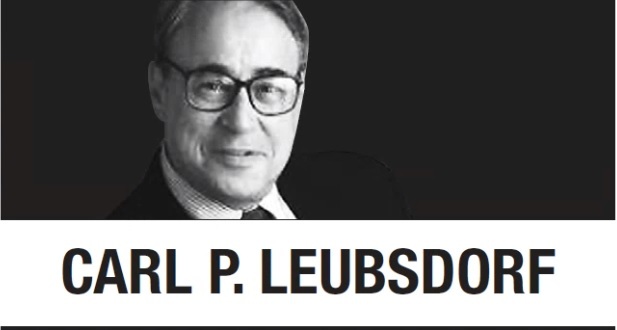[Carl P. Leubsdorf] The most significant result of Biden-Putin meeting
By Korea HeraldPublished : June 28, 2021 - 05:30

It was the mutual renewal of that concept that, if maintained, will be the most significant long-term result of the recent summit meeting between President Joe Biden and Russian President Vladimir Putin, especially after the unpredictable tenure of Donald Trump.
“Today, we reaffirm the principle that a nuclear war cannot be won and must never be fought,” the two leaders declared, vowing to join in “an integrated bilateral Strategic Stability dialogue” that will lay the basis for “future arms control and risk reduction measures.”
In their lengthy post-summit news conferences, both Putin and Biden stressed the degree to which they approach the relationship in a pragmatic, businesslike, non-ideological manner. But Biden cautioned that much depends on Russian deeds in the coming months.
For more than three decades, since the implosion of the old Soviet Union and Russia’s inheritance of its nuclear arsenal, restraint in action and agreements on arms control have exemplified their relationship despite frequent headline-making clashes.
Like his Soviet predecessors, Putin has often made mischief around the world and flouted norms of civilized society at home. He continues to do so. But a case can be made that his bark has often been worse than his bite, a recognition his country would be a big loser if he precipitated the ultimate conflict.
That, too, is nothing new. Even on their most hostile days during the four decades of Cold War, Soviet leaders and their American counterparts seemed to acknowledge by their actions there was a line beyond which neither wanted to go.
When the Soviet Union’s leaders cracked down on burgeoning democratic movements in their Eastern European satellites during the 1950s and 1960s and erected the infamous Berlin Wall, American presidents were sharply critical in word but restrained in action.
When President John F. Kennedy stood up to Soviet President Nikita Khrushchev’s brazen attempt to introduce offensive nuclear missiles into Cuba, the Soviets backed off and withdrew the missiles.
And when the Eastern European countries broke away from Moscow’s domination in the late 1980s, the restraint of the last Soviet leader, Mikhail Gorbachev, and the acquiescence of President George Bush facilitated a remarkably peaceful transition.
In the ensuing years, American presidents of both parties have sometimes shown considerable naivete about the possibility of potentially positive changes in post-Soviet Russia that belied the reality of the quashing of democracy by the former KGB agent who was running the country.
It was President George W. Bush, who said after his initial meeting with Putin that he looked him “in the eye” and got “a sense of his soul,” a characterization that Vice President Biden dismissed after a subsequent meeting with the Russian president. President Barack Obama saw the prospect of a “re-set” in relations that never happened.
And Trump mistakenly thought relations would improve if he was publicly deferential to Putin and accepted the Russian president’s denial of responsibility for his 2016 interference in US elections
The atmosphere and the statements last week were different. Both Biden and Putin described their talks as business-like sessions between two experienced leaders who understand from where the other was coming.
“It doesn’t necessarily mean that we need to look into the eyes and see the soul, and to pledge eternal love,” Putin said in response to a question about the past use of those terms. “We defend the national interests of our countries. And these relationships are always based on pragmatism.”
Biden said that he and Putin “share a unique responsibility to manage the relationship between two powerful and proud countries, a relationship that has to be stable and predictable.” And he said, “we should be able to cooperate where it’s in our mutual interest.”
“Let’s get something straight,” he added. “We know each other well; we’re not old friends. It’s just pure business.”
Biden said he hopes Putin will show his recognition of that over the next six months by exercising restraint and cooperating on issues like their mutual cyber-security concerns. But he conceded, “I’m not confident he’ll change his behavior.”
Last week’s meeting was the 18th time the leaders of the two countries have held this sort of one-on-one meeting since President Ronald Reagan met Gorbachev in 1985 in the same Swiss city, not counting other briefer interactions during larger conferences of world leaders.
Those four decades have seen dramatic changes in the world: the rise of China as the world’s second most powerful economic power, the enormous growth in other Asian countries like Korea and India, the increased economic strength of Europe; the United Kingdon’s economic break with the European Union.
As an economic power, Russia ranks behind the world’s top 10 counties, even trailing Canada and Brazil as well as most major European counties, Japan and India.
But it still has that nuclear arsenal, even though that status is no longer unique, and Putin made clear he recognizes Russia shares with the United States the responsibility for maintaining “strategic stability” in the world. That’s something that has not changed.
Carl P. Leubsdorf
Carl P. Leubsdorf is the former Washington bureau chief of the Dallas Morning News. -- Ed.
(Dallas Morning News / Tribune Content Agency)
-
Articles by Korea Herald


















![[KH Explains] Hyundai's full hybrid edge to pay off amid slow transition to pure EVs](http://res.heraldm.com/phpwas/restmb_idxmake.php?idx=652&simg=/content/image/2024/04/18/20240418050645_0.jpg&u=20240418181020)

![[Today’s K-pop] Zico drops snippet of collaboration with Jennie](http://res.heraldm.com/phpwas/restmb_idxmake.php?idx=642&simg=/content/image/2024/04/18/20240418050702_0.jpg&u=)